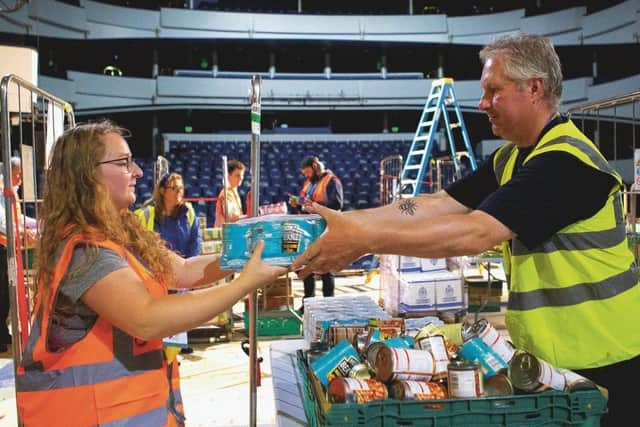How a Highland theatre put itself centre stage in the region's response to Covid-19


James Mackenzie-Blackman, chief executive of Eden Court in Inverness, had prepared a presentation of numbers and facts for a crisis meeting at the Highland Council in response to the early stages of lockdown. Once he heard what the chief executive of the council had to say, however, it went in the bin.
“I was invited early on to go to a meeting with the top civil servants at Highland Council, to talk about the urgent cash situation for Eden Court,” he recalls. “Just before I was invited to give my planned presentation, the chief exec of the council was raising all the massive issues facing the council, the need for a helpline for vulnerable people, the need to staff key worker childcare hubs during the Easter holidays, the need to establish humanitarian aid centres.
Advertisement
Hide Ad“I was thinking, ‘we can do that’.” And so Scotland’s largest single-site arts venue became a central focus of the emergency response to the Covid-19 crisis in the Highlands.


“I flung my presentation out the window and I basically just said, having listened to these problems, that my workforce can support the delivery of the urgent projects you need to deliver, and all I’d ask is that you protect as many of my jobs as you can. They totally got it. Within a week our box office telephone system was being used as an emergency helpline for residents across Highland about Covid19.
“Our engagement team were out working in key worker childcare hubs, and in the last two weeks our main stage, the Empire Theatre, has been transformed into the region’s humanitarian aid centre.
“So all the food packages and food parcels going out to people shielding across the Highlands are being packed up and distributed from here.
“We just wanted to place ourselves at the heart of the community response in the hope that this stands us in good stead.”
Prior to the dual announcements of emergency funding for the creative sectors, made this week by both the Scottish and UK Governments, Mackenzie-Blackman was hoping against hope for the same compassion and support to be shown to the thousands employed in the arts in Scotland and the UK. It was, he says, like standing on a cliff edge.
Advertisement
Hide Ad“Without the right level of support in the coming months, then we are in a situation where there could be no meaningful arts infrastructure north of Dundee before Christmas. That’s the stark reality.
“Lots of theatres around the country have started consulting staff about mass redundancies.
Advertisement
Hide Ad“We’ve not started that process yet, not least because we don’t have the cash to pay the severance, but also because in the two years I’ve been here I’ve built a team, and I don’t want to make all these colleagues redundant. These are highly skilled colleagues and recruitment, in a region like ours, is extremely challenging.”
With 142 of Eden Court’s near-170 payroll on furlough, Mackenzie-Blackman describes trying to navigate the future as “trying to turn the Titanic in a canal.” Rescheduling the venue’s programme is “the worst game of Jenga, with 117 shows now cancelled, rescheduled or postponed,” he says.
“When we thought we’d be back in after six weeks, lots of shows in the spring of 2020 got moved to autumn. Now they’re getting moved out of autumn into the few gaps left in 2021. It’s a logistical nightmare.”
While proposed contingency approaches have included talk of social distancing in theatres, there are obvious problems. “Social distancing in traditional auditoriums is just a no-go,” he says.
“Everything I hear is that there could be a need for social distancing until there is a vaccine. And if that’s the case I don’t see how indoor performing arts, economically structured as it is in the UK, is economically viable.” Cancelled shows this year include everything from small-scale traditional music gigs to touring West End productions such as 9to5, but Mackenzie-Blackman says Eden Court is more than a theatre and live entertainment venue.
“There are two arthouse cinemas, a cafe and three bars, a restaurant and dance, studios. It’s a place where children and young people come to get their SQAs in drama and dance,” he says.
Advertisement
Hide Ad“There are elderly members of the public who come in for a coffee. We’re a lifeline to these people, and that stopped. We take that responsibility really seriously. We are a huge community resource, and so many people tell us that they’re missing that.”
The chief executive talks of Eden Court’s annual profits from productions sitting at around £650,000 with £210,000 of that coming from the annual pantomime.
Advertisement
Hide Ad“While no decision has been made as yet around Eden Court’s festive show, many others have already been cancelled.
“It’s a huge decision for us, and I feel the weight of that around my shoulders very heavily,” he says.
While the recent funding announcements have provided short-term relief, Mackenzie-Blackman remains only cautiously hopeful.
“The news from both the Scottish Government and the UK Government is welcome,” he says. “The devil will, though, be in the detail and the combined £107 million needs to go a very long way. I hope, though, that through all this we’re able to build a more inclusive and equitable performing arts sector in Scotland.”
“There needs to be a reset. We’ve not been able to properly think about that reset yet, we’ve just been in survival-mode.
“But beyond securing our survival, I want to have big discussions about what Eden Court needs to look like going forward.
Advertisement
Hide Ad“And,” he adds, “I hope that much of that discussion is about further embedding us into the community, as we have during this crisis.”
This interview is part of a series commissioned by the Federation of Scottish Theatre to highlight the impact of the coronavirus pandemic on theatre and dance in Scotland and the connections performance makers are continuing to make with audiences. To find out more about what is happening in the sector and to lend support please follow #LoveTheatreScotland and #LoveDanceScotland. For more on Eden Court, visit www.eden-court.co.uk